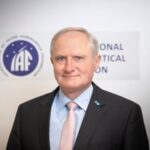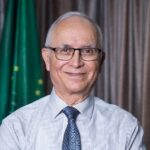How new nations are joining the international space community
International members of the world’s space community share the advancements made and challenges ahead for nations to watch during this panel discussion during the 39th Space Symposium.
Developments from Columbia, Slovakia, Singapore, the United Arab Emirates and the African Union Commission are highlighted as panelists discuss the priorities for their nations and how their efforts can contribute to global goals for advancing space.
Pilar Zamora Acevedo, executive director of the Columbian Space Agency, called space “a magic industry” that in her country, has brought together the public and private sectors and entrepreneurs. Already, she said, Columbia has 8,000 beneficiaries from space technology and advancements in fields including cancer research, robotics, and software development. One new initiative, she said, is launching a sustainability program that draws on satellite imagery to monitor agriculture and mining activities.
Mo Awadi, director of the Space Mission Department for the UAE Space Agency, explained that while UAE’s space program is almost 55 years old and has an astronaut program, satellites in orbit, and a Mars and beyond Mars programs, the nation also feels a sense of urgency in continuing to accelerate its place in space.
“As a country, we know we cannot take the time that it took other nations to get to where they are today,” he said. “We have to be doing it different. Must be be quicker. We have to find ways that work with what the vision we have in the UAE and how can we achieve all of that.”







